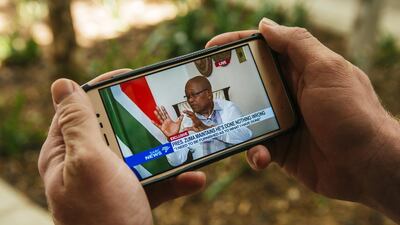On Monday Ellen Johnson Sirleaf, the recently retired president of the West African state of Liberia, was awarded a $5 million prize for what appears to be a remarkably simple act – that of leaving office at the end of her term. Now that presidents-for-life are the exception, smooth transfers of power are not unheard of in West Africa. In December 2016, in Ghana, the former foreign minister Nana Akufo-Addo defeated the incumbent President John Mahama. It was the third time since 2000 that Ghanaians have voted a government out of office in a peaceful and clean election.
In the tiny state of Gambia, President Yahya Jammeh, who had ruled for 22 years and promised to remain in power "for a billion years", was defeated at the polls by a political exile who had been working as a supermarket security guard in London.
It is worth mentioning these success stories because the general impression of the continent is one of political and economic gloom. This is an understandable reaction to the high spirits of a few years ago when the slogan was “Africa rising”, a tale of huge growth prospects, investment potential and spreading democracy.
Like all grand narratives this obscures as much as it reveals. One of the reason for gloom is that three big economies of sub-Saharan Africa – Nigeria, South Africa and Angola – are also among the most sluggish. Partly this is due to the decline in the oil price, which has affected Nigeria and Angola, but also due to corruption and weak government, notoriously affecting Nigeria and now the hot topic in South Africa, where President Jacob Zuma is being forced out of office by the ruling party, the African National Congress.
There is a parallel with South Africa's neighbour, Zimbabwe, also ruled by a liberation movement turned party, ZANU-PF, but one which became a vehicle for the ambitions of long-term President Robert Mugabe. The army stepped in last year to force Mr Mugabe to resign, an outcome which was so clearly necessary that African leaders chose to turn a blind eye to the military coup.
The tanks on the streets may in the end prove to be more of a palace coup. The army moved into action after Mr Mugabe's wife Grace secured the dismissal of the civilian politician closest to the security forces, Emmerson Mnangagwa. Mr Mnangagwa is now in power, and promising to hold elections this year. His task is to revive the economy without challenging the interests of the securocrats.
A better way of looking at Africa than the binary narratives of “Africa rising” versus “failed states everywhere” is to focus on a couple of distinct geographical areas. In West Africa, there is a strong sense of the importance of elections and vote monitoring, perhaps reflecting the fact that Ghana was a pioneer in achieving independence, in 1957. This is not true everywhere, of course: in Cameroon, President Paul Biya, in power since 1982, shows no sign of retiring.
In southern Africa the problem is different: liberation movements which have become ruling parties are growing old and tainted with arrogant cronyism. We can see this in Zimbabwe, in South Africa where President Zuma faces charges of corruption and abuse of power, and in Angola, where the family of Jose Eduardo dos Santos, president for almost 38 years, became notably wealthy.
In Angola, Mr Dos Santos, who led Angola through long civil wars, concentrated power in his hands and weakened the ruling party, the MPLA. But as his health declined, the temptation to put one of sons in his place as his successor proved a step too far, and the party took back control. His successor, Joao Lourenco, a general with a clean reputation, is trusted by the military to protect their business interests even as the public finances collapse. The new president must sort out the economy when oil production is set to decline next year.
Mr Zuma has no doubt been watching the fate of Mr Dos Santos, first with envy and then with some trepidation. On retirement the Angolan president was given a golden handshake in the form of legal protection from future prosecution. But the new president has been quick to remove his predecessor’s daughter, Isabel - said by Bloomberg to be the richest woman in Africa - from her post as head of the state oil company.
Mr Zuma would no doubt like legal protection for himself and his family. But that would be hard for South Africa to swallow. It still has an independent judiciary, which is determined not to be cowed by big men. In this respect it stands out. With the media focus on South Africa, there is a temptation to judge the whole continent by what happens there. If the Zuma transition is a success, the continent will be rising again. If it fails, Africa will be finished. This is another simplistic narrative.
Due to its history, South Africa is different from other countries and perhaps its governance structures are more resilient. Instead of seeing the whole continent through a South African lens, it is always worth looking at other countries where people are pushing for reform and progress is happening, albeit slowly and not without setbacks.

